![]()
The Human Gods of Elona are the most commonly worshiped pantheon of gods in the world. They are the beings who, in the religion of humans and other advanced races, are credited with all creation, providing knowledge and strength to the races of the land.
One of their titles, the Old Gods, is given because they left the world during the Exodus of the Gods at year 0. In the year 1 BE (before exodus), they bequeathed the gift of magic to all sentient races, but it was abused by all as each race tried to use this gift to destroy all others. After a plea from the Primeval Kings, the gods sealed most of the magic away in order to reduce the potential for widespread harm. Shortly thereafter the gods left Elona for good and returned to the Mists, beyond creation.
Since their Exodus, the Gods have not directly intervened with any worldly affairs, although they still watch the world and occasionally grant it their individual favor. Yearly, Grenth and Dwayna have a “battle” to gain favor from the races of Tyria in order to determine if winter should last longer, or if spring should come sooner.
Balthazar—God of War, Fire, and Challenge
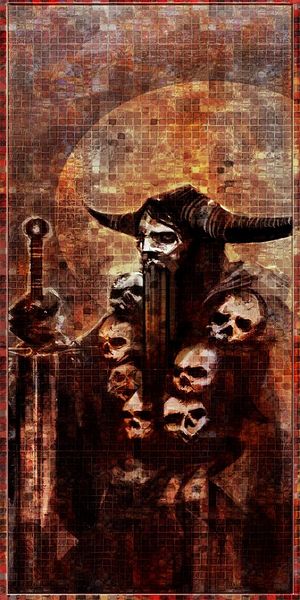
For weeks did the battle rage on, and those who had taken up the mantle of war grew weary and their courage began to falter.
Then did Balthazar, god of war and fire, appear to the soldiers, carrying with him a grand sword that did glow with such brilliance it blinded any who looked upon it. When he spoke, His voice was like thunder, and it shook the ground with force.
Then saith He, “Lift up thy weapons. For you are my soldiers, and must you be steadfast, strong, and brave of heart. They who neither hesitate nor stumble shall be rewarded. Then shall you have glory. Then shall your deeds be remembered for eternity.”
And then did release from His sword a hundred thousand flames, which encircled the soldiers. For this was the fire of courage, and forthwith did they follow the god into battle without fear or hesitation. Thence was the enemy struck down.
Depictions of Balthazar usually show him holding a greatsword with his battle drakes at his feet, and his shrines are often attended by warriors, monks of combat, arcane evokers, and others who revere raw power. It is said that, when the world has this god’s power, his shrines erupt with wreathes of flame.
Other titles given to the lord of battle include the Bringer of War, Finder of Wisdom, He That Shows Us the Final Truth, Judge of the Powerful, Revealer of Strength, and Scourge of the Prideful.
Dwayna—Goddess of Life and Air
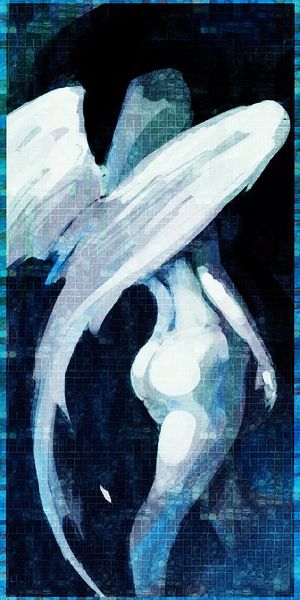
And when the world rang with the clanging of swords and did fire fall from the skies, Dwayna, goddess of life and air, heard the wailings and pleas of the weak.
And when the rumblings of war did not cease, came Her charge, the Primeval King, who did prostrate himself at Her feet.
And cast She now a glance upon the war-torn lands and wasted flesh of the fallen, and with tears upon Her cheek did lay Her gentle hands upon the prostrate man. Then saith She unto to him and all Her charges, “Lay down thy weapons, and as I have done unto ye, so ye must do for your brethren. Offer protection to the weak. Give solace and shelter to those who need it. Be ye a salve to the wounded.
“For I am your goddess, and I will give blessings to all who follow these teachings.”
Dwayna was the first of the Gods to step forth from the Mists, as well as the one who brought humanity to the world. She sought to make the world a paradise and led her people to peace for a time. Her teachings are celebrated during Wintersday, where her followers compete with Grenth to decide which god will dominate the coming year.
Dwayna is usually depicted as young, tall and slender, rising above the a dry and parched land on feathered wings. Most statues of Dwayna lie in ruins, but when the world gains her favors, it is said a lightning bolt strikes the broken pieces and they rearrange themselves into the form of the Goddess, supported by a ray of holy light.
Grenth—God of Ice and Death
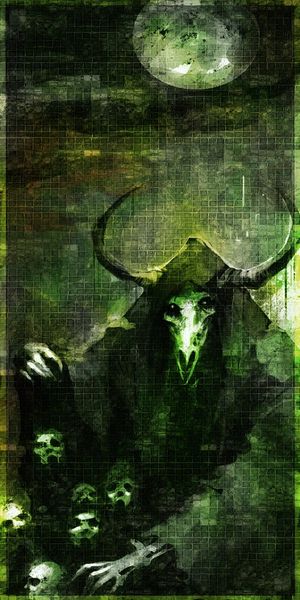
Came then Desmina, scorned and exiled by her people. And in her misery and wretchedness, did Desmina curse the gods for abandoning all who, like her, admired power and ambition.
And asketh she, “Where is the god to whom I may give my undying devotion? Where is the god to whom I may beg revenge against those who scorn me?”
And rumbled then the earth from far below, and with a terrible groan, split open. The ground grew white with frost and ice, and from forth the frozen earth spilled the rotted, skeletal minions of Grenth.
Appeared then the god, and with bony hands outstretched, welcomed the girl into His fold. Saith he, “I am your god. Follow where I lead, come whence I call, and the rotted corpses of the dead will be yours to control.” And swearing allegiance in life and beyond, did Desmina thence become the god’s first follower.
Grenth’s domain is the Underworld, the collective realm for the departed. Grenth’s teachings are celebrated during Wintersday, when his followers compete with Dwayna to determine which god will dominate the coming year. He is ususally depicted as having the body of a man but the skull of a beast, with the souls of his followers clamouring at his feet for the god’s fickle attention.
Elonians often leave offerings of bone, ivory, and—when times are especially hard—flesh and sinew at the feet of his statues. When the world has his favor, mist flows from the base of his shrines and their eyes glow brightly with a haunting green.
Lyssa—Twin Goddesses of Beauty and Illusion
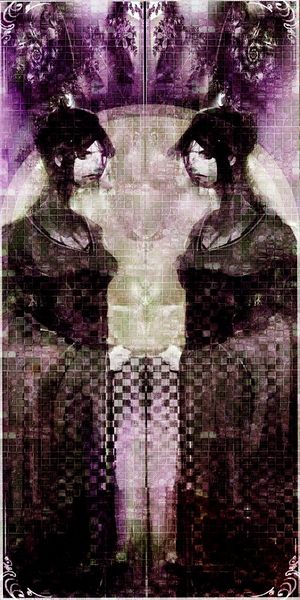
And it was, that a stranger came to the village of Wren seeking shelter and employment. Though young in years, her body was stooped and twisted, her flesh eaten by disease. “Ye have the mark of plague upon ye,” said one witness. “Leave this place lest you sicken our people.”
“I’ve lost my family and my home,” cried the desperate woman. “Have you no heart?” Yet each person, in turn, did look away.
Then from the crowd came a young woman, Sara. She looked upon the woman with pity. “If you need help,” said Sara, “I will give it.” And Sara did approach the gnarled, bent woman and did offer her a helping hand.
Then the sickened woman pulled from her body the robes of plague, revealing Herself to be the goddess Lyssa.
The people of Wren fell to their knees, begging Lyssa’s mercy. But lifting Sara gently, saith She, “True beauty is measured not by appearance but by actions and deeds. Many have eyes, but few have seen. Of all here, you saw the beauty behind the illusion. And you alone shall be blessed with My gifts.”
Individually known as Lyss and Ilya, she is the patron Goddess of assassins, illusionists, and entertainers. Lyss is particularly revered by the people of Vabbi, who believe that it was she who shaped their lands, and that they were molded in her own glorious image.
In most of the world, Lyssa is portrayed in the same way: as twin figures of exquisite beauty entwined in an eternal dance. When the world has her favor, a golden light appears around the base of her statues, and the shrines are enveloped in a brilliant white light, casting off any vegetation that has grown on the statue since the world last held her favor.
Melandru—Goddess of Nature and Earth
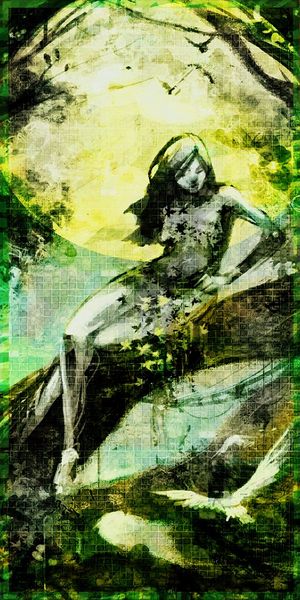
And it was that a tribe of godless humans wandered the land. Where camped did they lay waste, senselessly destroying everything nearby.
And so the tribe set out to find another camp, when suddenly sprouted a wall of thorny branches, which blocked their exit.
Then saith Ewan, leader of the tribe, “Know ye our ways. Whosoever does magic in this tribe shall be put to death.”
Yet none comes forward. Then, from the earth grows forth a large tree, and unfurling its branches, reveals the upper torso of a woman. Saith She, “I am Melandru, the Mother of earth and nature. Henceforth I bind ye to these lands. When they suffer, so shall ye suffer.”
And as She saith, so was it done. From their limbs sprouted branches, and the blood in their veins was the sap of trees. Then was Ewan and his tribe converted, and became they stewards of nature.
The eldest of the Gods, many of her followers are rangers and druids who maintain shrines to her along the roads to offer travelers food, water, and rest. From the Iboga-filled jungles of Istan to the most remote expanses of the Desolation, Melandru’s hand touches all. She urged peace between humanity and the races already present in the world, and sought to maintain balance between the forces of creation and destruction.
Melandru is often depicted as a winged dryad’s upper body coming from the trunk of a large, living tree, usually a mebayah or a rooted dreamflower. When the world has her favor, leaves begin to grow on statues of Melandru and water begins to flow from the vase she holds.